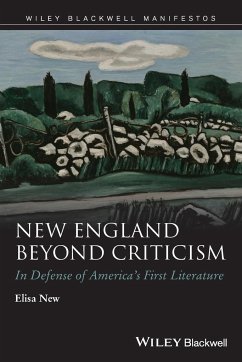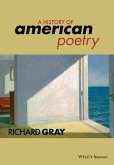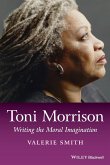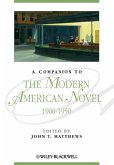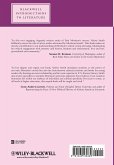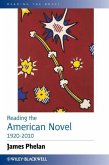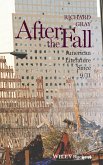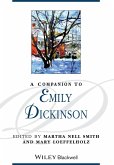New England Beyond Criticism is a passionate defense of the historical importance of the literature of New England that reasserts its role in conveying the social, intellectual and, artistic story of a culture in the making. Through in-depth studies and close readings of works by authors throughout literary history, including William Bradford, Emily Dickinson, Robert Frost, Henry David Thoreau, Susan Howe, and Marilynne Robinson, the author traces the impact of New England literature on the development of spirituality, community, and culture in America.
Timely and beautifully written, New England Beyond Criticism provides a passionate defense of the importance of the literature of New England to the American literary canon, and its impact on the development of spirituality, community, and culture in America.
An exploration and defense of the prominence of New England's literary tradition within the canon of American literature
Traces the impact of the literature of New England on the development of spirituality, community, and culture in America
Includes in-depth studies of work from authors and poets such as William Bradford, Emily Dickinson, Robert Frost, Henry David Thoreau, Susan Howe, and Marilynne Robinson
Examines the place and impression of New England literature in the nation's intellectual history and the lives of its readers
Hinweis: Dieser Artikel kann nur an eine deutsche Lieferadresse ausgeliefert werden.
Timely and beautifully written, New England Beyond Criticism provides a passionate defense of the importance of the literature of New England to the American literary canon, and its impact on the development of spirituality, community, and culture in America.
An exploration and defense of the prominence of New England's literary tradition within the canon of American literature
Traces the impact of the literature of New England on the development of spirituality, community, and culture in America
Includes in-depth studies of work from authors and poets such as William Bradford, Emily Dickinson, Robert Frost, Henry David Thoreau, Susan Howe, and Marilynne Robinson
Examines the place and impression of New England literature in the nation's intellectual history and the lives of its readers
Hinweis: Dieser Artikel kann nur an eine deutsche Lieferadresse ausgeliefert werden.
"Elisa New is a refreshing voice among critics and historians of literature. She has a keen sense of the nature of New England and its deep spiritual resources, reaching back to the Puritans, moving through the great nineteenth century expressions of interior landscapes and visions. Her readings strike me asare passionate, original, and very much at odds with a good deal that is now being said in academic circles. To say she is eccentric means, quite literally, that she stands outside of the center. In this, she seems in keeping with her Puritan fathers and mothers, those dark visionaries who gave birth to Hawthorne, Emerson, Thoreau, Dickinson, and others. This is a book I welcome and celebrate."
--Jay Parini, Middlebury College
"Elisa New's book is a remarkable achievement. It is very rare that a critic manages to ask what seem exactly the right questions, then to answer them in a lively and brilliant and evocative and supremely intelligent prose."
--Charles F. Altieri, University of California, Berkeley
"Lisa New's book is a remarkable achievement. It is very rare that a critic manages to ask what seem exactly the right questions, then to answer them in a lively and brilliant and evocative and supremely intelligent prose. New recognizes the force of criticism's critiques of traditional claims for the importance of New England writing in the shaping of America's images of itself. But she also recognizes how criticism tends to be limited by its academic protocols, so it cannot fully address the urgency of this writing to appeal to the full human being, hungry for meaning and idealization and passion challenged continually by that social reality on which the critics concentrate. New develops a critical stance fully responsive to what she calls the texts' "powers" as they seek to come to terms with demands for conversion, challenges to imagine how people produce values, and the constant worry that these very ambitions may lead imaginations to cross borders where terror seems the dominant affective register."
--Charles F. Altieri, University of California, Berkeley
--Jay Parini, Middlebury College
"Elisa New's book is a remarkable achievement. It is very rare that a critic manages to ask what seem exactly the right questions, then to answer them in a lively and brilliant and evocative and supremely intelligent prose."
--Charles F. Altieri, University of California, Berkeley
"Lisa New's book is a remarkable achievement. It is very rare that a critic manages to ask what seem exactly the right questions, then to answer them in a lively and brilliant and evocative and supremely intelligent prose. New recognizes the force of criticism's critiques of traditional claims for the importance of New England writing in the shaping of America's images of itself. But she also recognizes how criticism tends to be limited by its academic protocols, so it cannot fully address the urgency of this writing to appeal to the full human being, hungry for meaning and idealization and passion challenged continually by that social reality on which the critics concentrate. New develops a critical stance fully responsive to what she calls the texts' "powers" as they seek to come to terms with demands for conversion, challenges to imagine how people produce values, and the constant worry that these very ambitions may lead imaginations to cross borders where terror seems the dominant affective register."
--Charles F. Altieri, University of California, Berkeley

